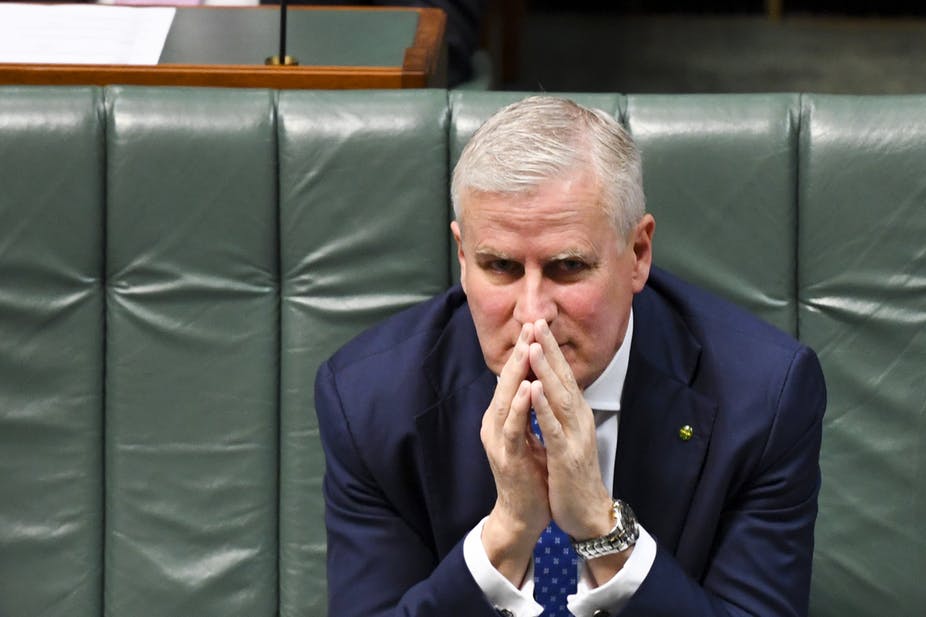
Some Nationals were furious when McKenzie suddenly sped up the code’s preparation in a government deal with Pauline Hanson after they had been told the code – for which they had been pressing – could not be delivered until well into next year.
McCormack, who is deputy prime minister, said in hindsight it would have been better to have told Nationals who’d been agitating for the code that negotiations were underway, so they could have informed their electorates of the work they’d undertaken and the fact the code was close.
“Calls unfortunately weren’t made to the right people at the right time,” but sometimes things slipped through the cracks, he said.
McCormack, speaking in The Conversation’s politics podcast, played down another snafu, when the Nationals and Prime Minister Scott Morrison separately but simultaneously announced the government’s new cash grant to drought-stricken farmers coming off the Farm Household Allowance.
He noted he hadn’t called the news conference – it was called by McKenzie’s office – but said the result was that all bases had been covered. But he said, “Look, the call just wasn’t made. And certainly I know for the future, those calls will be made”.
McCormack said the government would do more on the drought within weeks and was currently considering measures, adding “there’s absolutely no question we need to do some more”. He indicated the government would release the report from former drought co-ordinator Stephen Day “in a couple of weeks, when cabinet has considered it”. The government has been under strong criticism for sitting on the Day report.
Beyond the coming measures, the drought issue would have to be addressed again next year if it did not rain in March-April, for the winter sowing season, McCormack said.
He flagged a willingness to look at the proposal from the National Farmers’ Federation (NFF), in its drought plan released earlier Wednesday, for exit assistance for farmers who decide to sell up because of the drought. He noted the federal government had helped with adjustment for the car industry. State governments would also have to look at readjustment assistance, he said.
“Yes, the federal government and indeed state governments would have to look at what readjustment, what exit strategies we could assist with.
“Indeed, we’ve done it with the car industry in Adelaide and in Melbourne. We’ve done it through diversifying interests in irrigation areas. We’ve done it in other industries where there’s been – well the tobacco industry, that’s another one that did receive, or people in that industry, did receive exit money.”
But he had a strong cautionary message for farmers thinking about whether to leave or stay.
“They need to absolutely make sure they don’t self-assess, they need to absolutely make sure that they consult their families foremost, that they talk to rural financial counsellors, they talk to their accountants, their banks.
“They take every bit of good advice available before they take that ultimate step and then look at what the future might hold.”
He had spoken to NFF president Fiona Simpson about this call for an exit strategy.
“That’s a difficult decision and outcome for the NFF to reach[…]encouraging or indeed calling for the exit strategy. That’s not the usual way. But this isn’t the usual drought,” he said.
Asked about NFF recommendations, also in their submission, for relief on local rates and Commonwealth subsidies for the payroll expenses of farming businesses, McCormack said these fell within the responsibility of state governments.
Questioned on the concern by some Nationals that Morrison had taken political “ownership” of the drought, squeezing out the junior Coalition partner, McCormack defended his own level of activity and said “we do things together. We’re in a Coalition together”.
Asked whether the Nationals needed to be more assertive this term, he said it was “important we’re not being seen to be argumentative all the time.”
He and Morrison had “our arguments behind closed doors – well, I won’t say arguments, let’s just term them differences of opinion.
“Sometimes we just agree to disagree,” he said.
“We are like-minded people, but we are different people. And we get on, you know, 99.9% of the time – when we disagree, we will disagree behind closed doors.”

























